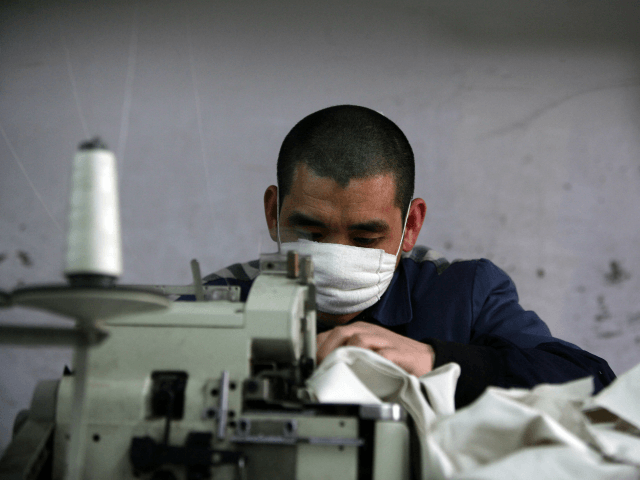The Associated Press (AP) published a shocking report Monday night revealing that China is beginning to equip its prisons for Muslim ethnic minorities, referred to as internment or concentration camps by survivors, with large manufacturing centers where doctors and other highly-educated people are forced to learn to sew cheap clothing.
Survivors of the camps told AP they were paid “not a single cent” for their labor.
Prior research revealed that officials use the camps, which they dubbed “vocational centers” and claim ethnic Uighurs and other minorities need because of their lack of education, to torture, indoctrinate, and kill members of the persecuted minority. The most recent estimates suggest that between one and two million Uighurs, Kazakhs, Kyrgyz, and other minority Muslims have “disappeared” into the camps.
The camps are believed to nearly all exist in Xinjiang, China’s westernmost province and home to its largest Muslim population. A report in October estimated that at least 44 camps exist in the region; two months later, Reuters expanded that estimate to as many as 1,200 camps, using satellite images of the facilities.
The AP traced the trajectory of some of the clothing produced by slave labor in the concentration camps to an American apparel company operating on the eastern seaboard, while emphasizing that it is nearly impossible to identify which individual pieces of clothing come from a Uighur sweatshop, as opposed to other slave labor facilities in China.
The company in question, Badger Sportswear, confirmed that it had imported some items from China, but claimed it would cease to do so and investigate the claims the AP made. The New York Times also named Badger Sportswear as a purchaser of Muslim slave labor from China in a report Monday, but did not provide as much detail in their report as the AP did.
The former camp internees and relatives who spoke to the AP said they did not understand why China would need to provide vocational training for individuals with graduate degrees and successful careers. One woman, whose sister disappeared into the camps, decried the process, noting that her sister is a doctor. “What are they going to do, train a doctor to be a seamstress?” she asked rhetorically.
Another relative, the mother of a prisoner at one of the camps, identified her young daughter as an advertising associate with a college degree who “lived a typical urban lifestyle with a computer, a washing machine and an apartment in the city center.”
“They say they’re teaching her to weave clothes. But the thing is, she’s well educated and had a job,” she lamented. “What’s the point of this training?”
Reports indicate that, depending on the Chinese company cooperating with the government to run the factories, prisoners are either paid barely minimum wage or nothing at all. There is no evidence that prisoners can leave or have access to their families, the way they would in a normal job. Companies like Hetian Taida, which sold clothes to Badger Sportswear, claimed to AP they are “making our contribution to eradicating poverty.”
While the AP refers to these companies as “privately owned,” China is a communist country and does not permit businesses to act independently of the regime, even when they appear to be run by private persons. The most high-profile example of this scheme is the recent revelation that Jack Ma, the head of the retail giant Ali Baba, is a member of the Communist Party.
The forced labor appears to be a new development in the camps. Those who were released before the beginning of factory constructions say they were subjected to indoctrination, forced to learn Mandarin and pledge allegiance to Communist Party chief Xi Jinping.
“They didn’t teach me anything. They were brainwashing me, trying to make us believe how great China is, how powerful it is, how developed its economy is,” one former prisoner told the AP.
This description matches prior testimonies from former prisoners. Mihrigul Tursun, a Uighur detainee who detailed her experience at a camp in Washington, DC, last month, said authorities killed one of her infant triplets, beat her, and tortured her with an electrocution device. Tursun noted that Chinese officials urged her to abandon her faith and Uighur language and pledge loyalty to Beijing throughout the torture.
The Chinese government responded to her testimony through social media, claiming that the majority Han Chinese people all “laughed” when hearing her bear witness to her suffering.
Similarly, the Chinese Foreign Ministry dismissed the recent reports of slave labor at the camps. The AP quotes spokeswoman Hua Chunying as saying that the “reports are completely based on hearsay evidence or made out of thin air.” Responding to the earlier New York Times report on Monday, Hua said, “I hope that the media can report and view the relevant issue in an objective and all-round manner instead of levying groundless accusations against China based on speculations and hearsay.”

COMMENTS
Please let us know if you're having issues with commenting.